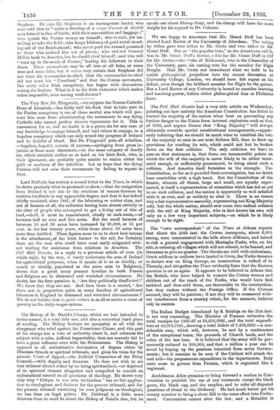Lord Dufferin has written a second letter to the Times,
in which he shows precisely what he promised to show,—that the emigration from Ireland is not due to the evictions of tenant-farmers by ruthless landlords in any appreciable degree, and that it has indeed chiefly consisted, since 1811, of the labouring or cottier class, and not of farmers at all, the reduction having been almost entirely in the class of people who attempted to get a living out of bits of land,—held, it must be remembered, chiefly at rack-rents,—of between half an acre and five acres. But the small farmers of between 15 and 30 acres have increased by 61,000, or 75 per cent. in the last twenty years, while those above 30 acres have More than doubled. These figures seem to us to show how intense is the aitachment.,of the Irish farmer to the soil, for Certairdy these are the men who could have most easily emigrated with- out waiting for assistance from relations in America. The Pall Mall Gazette, in a reply to a previous article of ours (in which reply, by the way, it vastly uuderratss the area of Ireland for agricultural purposesf when it speaks of it as as thickly, or nearly as thickly, populated as the same area in Belgium), shows that a great many peasant families in both France and Belgium are in distressed and wretched circumstances. No 'doubt, but the first question is, Are they politically disaffected ?' We know that they are not. And then there is a second, Are there not in proportion quite as many families of agricultural labourers in England in distressed and wretched circumstances ?' We do not believe that la petite culture is at all so active a cause of poverty as the daily-wages system.






























 Previous page
Previous page